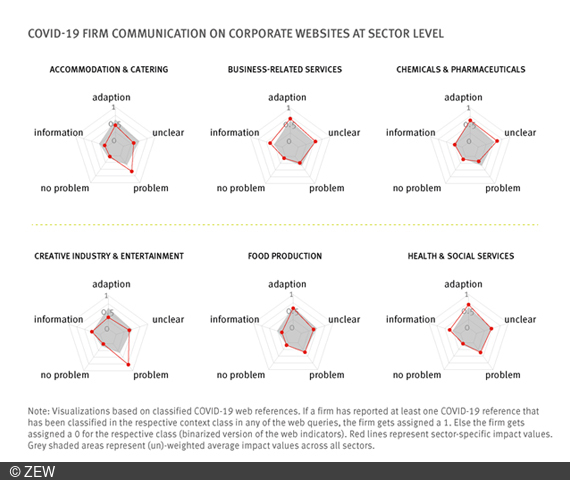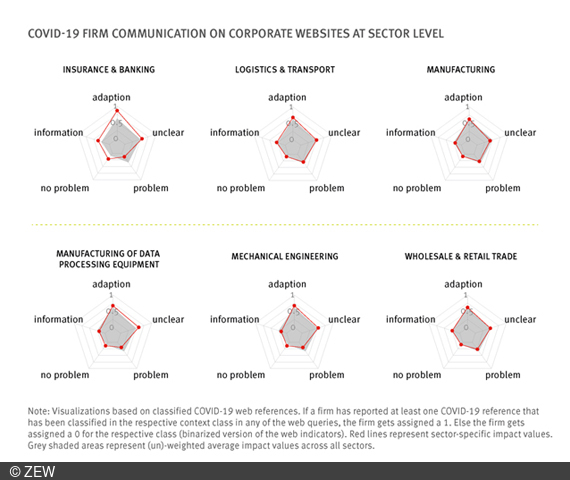Prompt Availability of Information Enables Efficient and Targeted Government Action in Crises
ResearchWith the oil crisis, the bursting of the dot-com bubble, the financial and banking crisis, and the COVID-19 pandemic, the past fifty years have seen several economic shocks that often had severe consequences for the business landscape. Governments are often only able to provide targeted support and respond appropriately to such unexpected events with a significant time lag, as appropriate data is usually not available at the beginning of a crisis. AI-based analysis of corporate websites can remedy this situation by complementing traditional survey methods and providing reliable early forecasts in a timely manner. This is shown by studies conducted by ZEW Mannheim in cooperation with Justus Liebig University Giessen during the coronavirus crisis.
In order to provide rapid assistance, as was necessary at the beginning of the on-going pandemic, the government saw no other option than to use the much-cited “bazooka”, given the lack of data that would have allowed a more differentiated policy response. Although aid is provided in this way, it is anything but targeted as far as the distribution of the financial resources used is concerned. “In order to provide political decision-makers with relevant information as early as possible and to be able to channel state aid effectively, web-based analysis proves to be an extremely helpful instrument,” says Dr. Georg Licht, head of the ZEW Research Department “Economics of Innovation and Industrial Dynamics”.
In the period immediately following an unexpected economic shock, there is usually a great need for information, which coincides with a significant lack of relevant information. Based on this inadequate data availability, a team of researchers at ZEW, together with the start-up company ISTARI.AI, developed an artificial intelligence-based methodology for the automated evaluation of corporate websites, which is now also being used by institutions in other European countries. With the help of the AI algorithm developed by ISTARI.AI, more than one million corporate websites of German companies were scanned and evaluated for references to the coronavirus pandemic every week during the COVID-19 crisis. The algorithm can reliably distinguish whether companies report problems (closures, cancellation of events, etc.) or announce adaptive measures (adjusted opening hours, delivery service, etc.) in connection with the pandemic. In this way, it can be determined at an early stage which companies and economic sectors are mainly affected. The analysis carried out from March to May 2020 made it possible to obtain an initial overview of the economic effects resulting from the unexpected economic shock. The advantage of a dynamic data source such as the website analysis is that it allows the impacts of an economic shock to be determined almost in real time.
With traditional forms of data collection such as surveys, it is virtually impossible to determine impact in real time, as it takes a lot of time to prepare, conduct and evaluate them. Other data sources such as balance sheet or credit rating data are also important indicators. But they too have the disadvantage that they only reveal the impact of a crisis when the economic shock has already taken full effect and is visible in payment discipline and company balance sheets.
ZEW researchers recommend set of measures
Particularly in the coronavirus crisis, where politicians had to react quickly but at the same time faced a large information deficit regarding its economic impact, web-based evaluations are a valuable tool for designing targeted, early relief measures for businesses. Traditional forms of data collection and data sources, on the other hand, have the advantage that they can capture the extent of a shock in a more differentiated way and also allow for an analysis of the actual impact – albeit with a considerable time lag.
To improve the prompt availability of information in the event of economic crises, to be able to initiate government action in the most targeted and timely manner possible, and to continuously optimise it during the course of the crisis, the ZEW researchers recommend a set of measures that combines various data sources in order to fully capture the economic impact of a crisis. At first, a prompt evaluation of a large number of company websites should be carried out in order to quickly improve the supply of information. This is followed at a later stage by the optimisation and supplementation of this information through surveys among selected companies, whereby the findings from the website analysis should be incorporated into the design of the surveys.
“A retrospective look at credit rating data of the observed companies suggests that this approach delivers reliable results that provide a leading indication of later rating movements,” explains Julian Dörr from the ZEW project team that conducted the study. In this way, the ZEW researchers show that the results of the web analysis can be used as early indicators regarding changes in the creditworthiness of the companies in the later course of the crisis. Information from automatically evaluated mass web data is thus of high value for political and economic decision-makers. Especially in dynamic crisis situations, AI-based web analytics can complement traditional survey methods and provide up-to-date as well as reliable early forecasts.
In the future, the ZEW researchers want to concentrate on the interpretability of their AI models (‘explainable AI’). “In recent years, there has been an increasing awareness that artificial intelligence systems should not be a black box in certain contexts. Instead, their results should be interpretable, fair, transparent and comprehensible. Especially against the background that political decisions will increasingly be based on the results of AI models, these results must fulfil all these criteria,” asserts Dr. Jan Kinne, ZEW economist and co-founder of ISTARI.AI. For example, it is important to know which words and word combinations have a particularly high weight in the predictions. At the same time, however, there are also advantages to a black box, considering that it is more difficult to manipulate than an open, fully transparent system.


